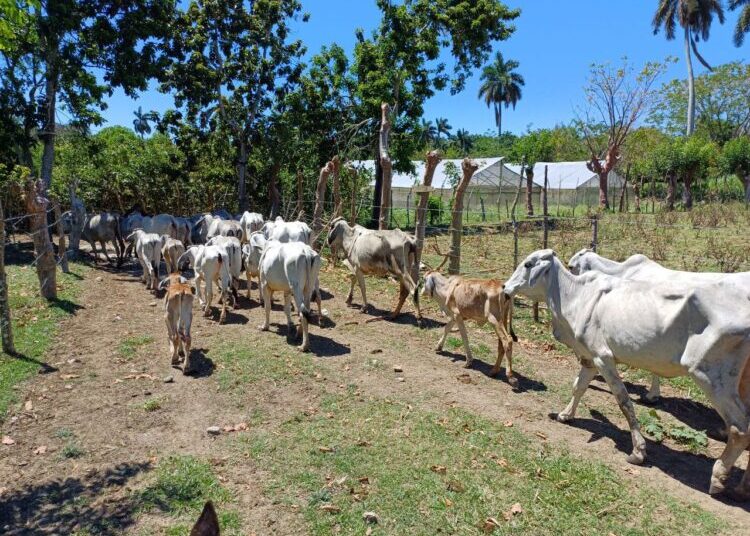What began from a mere subsistence instinct 12 years ago is today one of the most recognized experiences of sustainability and agroecology in Cuba.
Finca Vista Hermosa, a local development project in Guanabacoa, on the outskirts of Havana, brings together four family farms and is a benchmark where many look to when it comes to learning about the circular economy in the agricultural sector.
Those approaching the history of this endeavor for the first time do not suspect that most of its successes are based on a very old technique, as risky as it is beneficial: trial-error.

The coordinator of Finca Vista Hermosa, Raúl Relova, acknowledged to OnCuba that there have been many attempts to achieve a sustainable business model, recognized even by the director general of the UN Food and Agriculture Organization (FAO), QU Dongyu, last September, during a visit to the farm.
https://twitter.com/FAOAmericas/status/1703242443141845138
Relova, a lawyer by training, who founded this experience in 2012 together with his childhood friend Misael Ponce, usufructuary of the Vista Hermosa farm, explained that they found in agroecology the best way to start this project where they combined dreams and knowledge, not only theirs, but of both families.
At the beginning and for almost ten years, the logic of the business was to supply all the needs of the Mediterráneo Havana Restaurant, located in Vedado, also founded by them. During the COVID-19 pandemic, they turned to delivery to stay in the market and managed to make deliveries to more than 2,000 families in Havana.
However, they did not reopen the restaurant. But the “farm to table” philosophy, which had attracted American visitors to the farm throughout that period to see where the ingredients for the dishes came from, gave new meaning to the venture.
When they were able to resume in-person activities, the farm not only began to receive the usual tourists, but the national public also has a space reserved at the thatched-roof restaurant on weekends.


Lessons and certainties
After 12 years of entrepreneurship in Vista Hermosa, Raúl has turned into certainties some of the lessons he had to learn during the growth of the business.
“Sustainability for us is ‘do what you can do and maintain.’ With what you have. Circular economy is taking advantage of everything you have and incorporating what is discarded back into what you do,” explains Relova, who believes that, sometimes, these terms are conceptualized too much.
At Vista Hermosa they put these ideas into practice in different ways. The same as taking advantage of waste to feed livestock or to produce organic matter.
“We feed the Cuban pigs on the farm with the whey generated by the dairy industry we have. It does not replace feed, but incorporated into the diet as a complement does help a lot,” he commented.
That good work motivated others to be part of this venture. Three years ago, other neighboring farms (El Jíbaro, La Prodigiosa and Vista Alegre) decided to join together and created the local development project that bears the name of Vista Hermosa, which has 120 hectares.
“In some way we always collaborate with the neighbors, but doing so in a structured way means committing each one to the task of fulfilling their part. Dependency mechanisms are generated, where if one fails, the other too,” says Raúl.
The chain takes advantage of the best that each one can offer and has consolidated the initial experience of Vista Hermosa in the management of pigs, cattle, goats and buffalo and the production of meat, milk, eggs, vegetables and other crops with which the contracts are guaranteed and the operation of the restaurant on the farm is supported.
Only with the surplus
Like the rest of the country’s livestock producers, the farmers of Vista Hermosa must comply with what is called “state order,” a plan to deliver meat and milk to the agricultural system for processing by state enterprises and subsequent distribution to the population.
Both the production of dairy products (cheese and yogurt), marketed under their Nabacoa brand, and the production of meat intended for consumption in the tourist experience they offer is sustained by surplus production.
Currently, the authorities of the sector have asked them to deliver beyond what was agreed, due to the current milk deficit and to guarantee consumption in hospitals and other healthcare centers. This situation has impacted the business model.

“The chain of sustainability is broken. If we do not produce cheese, we do not have whey and not having whey impacts pig farming. The gastronomic activity is greatly affected because pork is the basis of almost 30 or 40 percent of the offer,” explains Raúl, who hopes to return to normality soon.
As a local development project, Vista Hermosa also contributes five percent of its profits to a government fund intended to encourage the creation of other similar experiences. They care for a center for children without family protection and a nursing home. Additionally, they encourage a love of the land with an interest club.
Likewise, they share what has gone well and what hasn’t with farmers in the area, and even from other provinces in the country. “To the extent that we help others develop, we can establish mechanisms of collaboration and joint participation, where we all grow.”

The future
Regardless of the fact that they have been paving the way for others for more than a decade, the Vista Hermosa team still maintains their amazement at what they have achieved. “We never imagined we would get this far. We thought about solving a problem for ourselves and now we know that we are making it easier for many people, even a province,” commented Relova, who has dedicated more than 25 years to consulting.
The livestock production experience of Finca Vista Hermosa and the production chains it has generated will be replicated on other farms in Guanabacoa, with funds from international cooperation.
Vista Hermosa will also be a beneficiary of this financing, which will allow them, among other investments, to build a new plant for milk processing and cheese manufacturing, which will double the volume they are currently able to produce.
Other short and medium-term goals are greater use of renewable energy sources, perfecting waste management, as well as improving agricultural and animal feed production. They also plan to expand agroecological tourism.
The dreams of two families, united by friendship and love for their land, have been taking shape in an innovative, sustainable and collaborative business. Vista Hermosa is an example that, under the circular economy approach, it is possible to produce food, with less environmental impact and economic benefits.











I brought a culinary group led by a popular Chef from our city last February and we all were very impressed with your facilities. Farm to table is the major contributor to the success of Chef Sam in Charlotte NC so to see this happening in Cuba was very exciting. Especially to see how vegetables are grown in the intense heat. Chef Sam and Chef Alberto Gonzales of Havana collaborated on dinner for our group. We are coming back in January and would like more involvement with Finca Vista Hermosa.